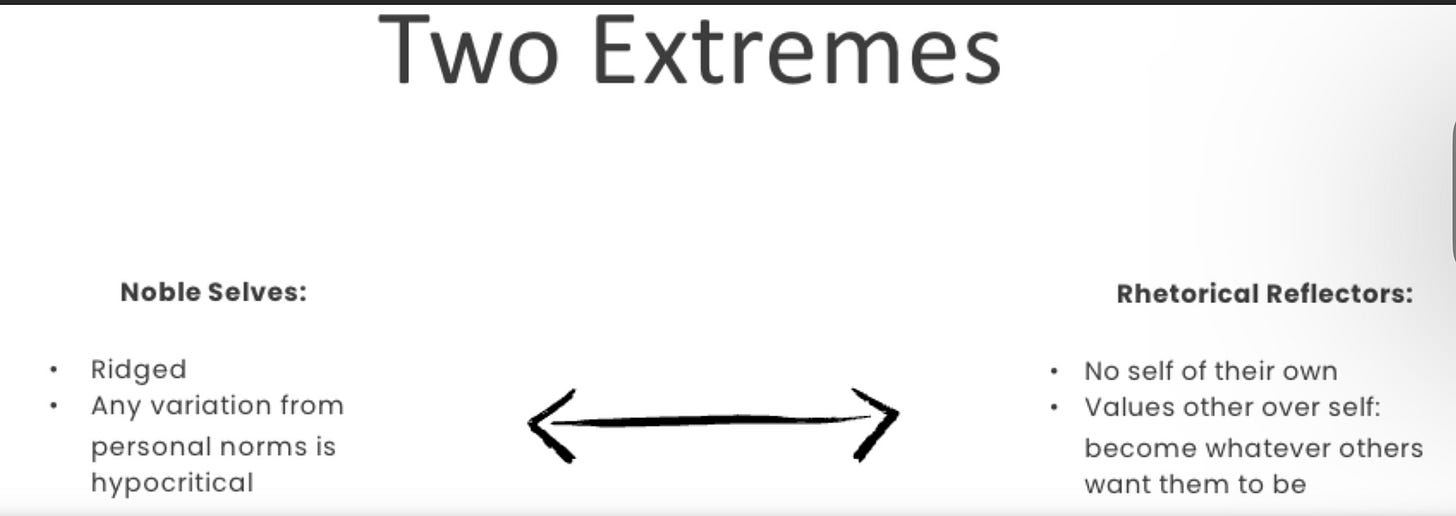Rhetorical sensitivity sounds so complex… like graduate students who never leave the library. But it is a wonderful tool that will help you communicate sooo much better.
Example
Here is a story to describe rhetorical sensitivity at its best.
When my husband was interning at the Jet Propulsion Lab in Pasadena, he worked in a unit that had a central printer.
One day he encountered a perplexed engineer at the printer. The engineer asked how to do something with the printer.
My husband answered, “I don’t know.”
The engineer asked the question again.
My husband replied, “ I don’t know.”
The engineer was not understanding this simple language, so he asked the question again.
This time, my husband realized his answer wasn’t specific enough for the detailed mind of the engineer, so he changed his answer: “I’m sorry but I’m not well versed in the parameters of this machine.” This answer met the ‘audience’. The engineer said “oh!” And returned to his office.
Here’s another:
Before we went to Paris last year I spent about 9 months trying to learn French. I went all in. I spent at least 10, sometimes 15 hours a week learning French. I tried every app, and hired a tutor on Preply. I was determined to be able to communicate in French. When we got there I only needed one sentence (besides the niceties).
We were at the Palace of Versailles. I could not figure out where I was on the map. My feet hurt and I was suddenly in a really busy area with people moving both ways.
I wanted to identify the chapel I was in front of, we were on the top floor and I wanted to see the bottom half.
I asked a guard what the chapel name was. She told me to go up, to the right and down the hall (French did help, but her hands were talking too).
I changed my question and tried again. She sent me to the same place (this time I figured out she was sending me to the royal chambers).
Finally, I took the map and held it out asking “Où est ici?” (Where is here?), as I pointed to the ground and circled the map with my finger. Yup. After months of study on a ton of apps and a tutor, this was the one time I needed to create a whole sentence. 😳
I finally spoke in a language she understood and she showed me where we were.
Definition
Here is a simple definition of rhetorical sensitivity: communicate what you want to say in a way that others will understand you.
The trick is that you have to pay attention to the person you are currently talking to in order to change your approach accordingly.
Here is the formal definition:
“Rhetorical sensitivity is an approach to communication where the individual thinks about what is to be said and decides how to say it taking into account the person being spoken to, the topic of discussion and the communication situation.”1
But communication is a two-way street. How do you know how much of your message needs revising up front, and when it might be better to start a conversation and then reach a point of agreement.
McCormick admits that rhetorical sensitivity has extremes, neither of which are healthy.
Those working from the Noble Self would expect everyone to understand what they are saying. To change their words in order to be understood would feel wrong or even destructive.
Rhetorical Reflectors shift their meaning to meet the audience. Neither of those are good communication. Good communication changes us both. So we are both active participants in the conversation. Which means we both start at different places.
Let’s think what this looks like when you are trying to get your teen to take out the garbage. How much of the message do you need to change in order to be heard (some of you just said absolutely nothing!!🤣🤣). However, what if you put your hand on their arm and made sure you had their attention before you started talking? Is that changing how you communicate in order to be understood?
I think so.
What might it look like if you want to discuss a problem with your neighbor?
How would you set the environment to make sure you are both comfortable and not distracted?
What language (complex, simple, colloquial (local slang) or a translator app) would you use?
What is your message?
What do you want them to hear?
Do you need an answer from them? If so, what is the question?
What will you do to make sure you’ve heard what they have to say and that you heard what they meant?
Why this matters
We are moving from the modern age to a new age that is yet to be defined. We are in the Post-modern Era, but we are not yet solidified enough for this to be an Age. Right now we are laying the foundation pieces for what this new age will be like. Will it be like the Dark Ages, a time of fear, or the Modern Age, a time of hope?
Here is what we know: due to Internet connectivity, broad immigration, and ease of travel, we are going into a time where our “world” isn’t just our tribe, state or nation (pre Middle Ages, Middle Ages, Modern Age).
Our world is the whole world that includes a lot of people whose social norms, lived reality and language is completely different than ours. But they are part of our world. We are building a shared reality.
If we discover new capabilities in communication, we will build an Age of hope. If we don’t, we won’t.
Karen L. McCormick, “Communicator Style as a Predictor of Rhetorical Sensitivity” (M.A., San Jose State University, 1990), 5, accessed November 2, 2019, https://search.proquest.com/docview/303914333/abstract/BA499A6FD6104DA8PQ/7.






Interesting post-thank you!